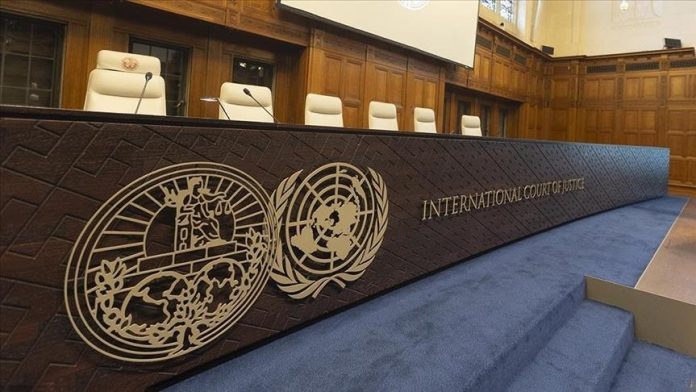Third countries can be held accountable in international courts for collaborating in or contributing to genocide, says ICJ
10 Jul. 24: Countries providing weapons and other military equipment to Israel could be held responsible for its crimes in Gaza, according to international agreements and decisions of the International Court of Justice (ICJ), reports Anadolu Agency.
Although this primarily concerns the US and Germany, it involves mostly other Western countries.
Anadolu correspondents compiled the obligations of states under international law to avoid arms shipments to regions where international law is clearly being violated.
Governments in the Netherlands, the UK, US, Canada, Denmark, and Germany, which provide arms to Israel, face lawsuits from their respective national courts.
The case brought by Nicaragua against Germany at the ICJ for its financial support to Israel indicates that third countries could also be held accountable for the crimes committed by Israel for supporting it with arms.
These lawsuits in local courts and ICJ decisions have led to changes in the arms export policies of countries like Canada, Spain, and the Netherlands. However, the US, Germany, and the UK have not made significant changes to their support of arms to Israel despite ICJ rulings.
Third countries can be held accountable in international courts for collaborating in or contributing to genocide.
The ICJ’s 2007 ruling on the Srebrenica Genocide affirmed that states, not just individuals, bear responsibility for such crimes.
Nicaragua’s case against Germany concerning Israel’s actions in Gaza underscores this point. Despite the ongoing genocide, continued military support to Israel could lead to supporting states being classified as “states aiding genocide.”
The ICJ’s 2024 decisions stress the obligation of states to prevent genocide and mandate immediate action from Israel, highlighting the importance for third countries to cease arms shipments.
The ICJ in its ruling on the Srebrenica Genocide emphasizes that states party to the Genocide Convention have an obligation not to support genocide, which includes not sending arms when they are aware or expected to be aware of a serious risk of genocide.
The court’s Jan. 26 decision highlighting the clear risk of genocide in Gaza nullifies the defense of third states claiming ignorance or unawareness of the potential genocide risk.
Its ruling that there is a “potential risk of genocide” in Gaza imposes an obligation on third states not only to refrain from supporting but also to actively prevent such genocide.
Continuing arms shipments to Israel by states would mean violating the ICJ’s mandate to not support genocide.
Moreover, even without the ICJ ruling on Gaza, third states are obliged based on international law to cease arms shipments to Israel, exercising due diligence in assessing how the weapons will be used.
The 2013 UN Arms Trade Treaty (ATT) stipulates in Article 6(3) that arms transfers should be prohibited if the state knows that the weapons will be used for genocide, crimes against humanity, or war crimes.
Considering the ICJ’s rulings on Gaza and ongoing investigations by the International Criminal Court (ICC), it is evident that arms-supplying states should be aware or are expected to be aware of the risk of these weapons being used for such crimes by Israel.
Article 7 of the ATT requires states to assess whether the equipment might be used to commit or facilitate a violation of international humanitarian law before authorizing arms shipments.
The ATT does not require conclusive proof of the crimes for the prohibition of arms transfers; it is sufficient for the supplying states to be aware or reasonably expected to be aware of the potential for such crimes.
Therefore, arguments by arms-supplying states that Israel’s violations have not been conclusively proven, that the violations are due to reasons other than the supplied weapons, or that the weapons did not directly contribute to the violations, are unlikely to be accepted.
On March 1, 2024, Nicaragua filed a case at the ICJ against Germany, seeking to halt Germany’s military, political and financial support to Israel.
Nicaragua accused the German government of continuing to supply arms to Israel despite being aware of the genocide risk in Gaza. It argued that Germany, which views Israel’s security as a core priority, has an obligation under international law not to support genocide. By supplying arms to Israel, Germany is allegedly facilitating the genocide in Gaza.
Although the ICJ did not find sufficient grounds to issue the provisional measures requested by Nicaragua against Germany, it emphasized the importance of reminding all states of their international obligations regarding arms transfers to parties in armed conflicts. The court underscored that these obligations particularly apply to Germany, which supplies arms to Israel and is a party to relevant international treaties.
The ICJ warned that third countries supplying arms to states violating international law could bear international responsibility for those violations. The court reminded states that they have responsibilities under international law when supplying arms to Israel.




